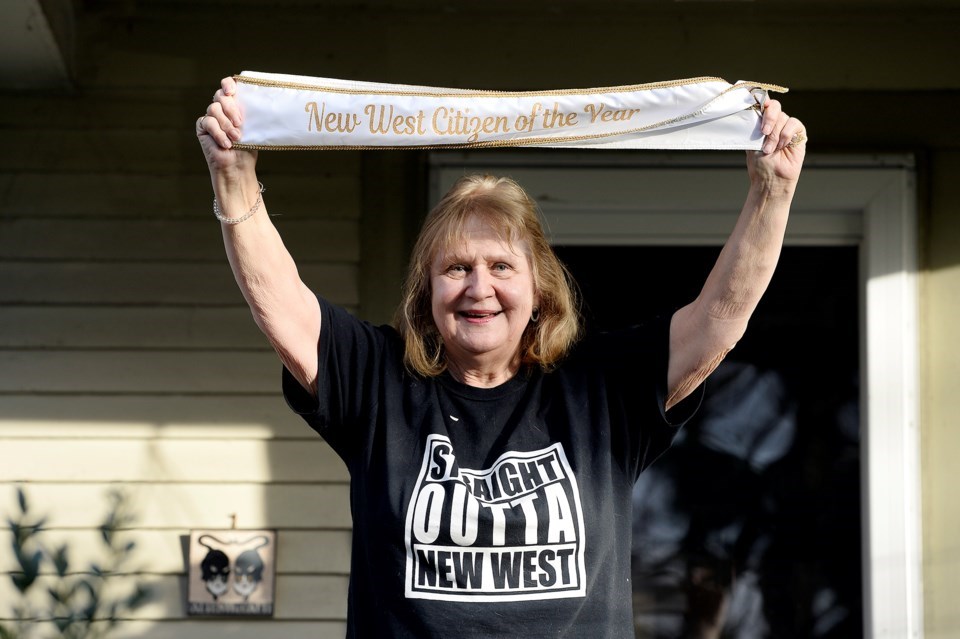A former New Westminster city councillor remains in the hospital where she’s recovering from a stroke – and family and friends believe ambulance delays may have exacerbated her condition.
Lorrie Williams, who served on city council for 16 years, suffered a stroke at her Sapperton home on Aug. 7. Her house is located a couple of blocks away from Royal Columbian Hospital.
“She's still in hospital. She still has paralysis,” said Allan Greenwood, Williams’ brother. “We're just kind of waiting to see what's going to happen next.”
Greenwood noted that advertisements says to act FAST to help ensure a good recovery for people having strokes. (FAST - Facial drooping, Arm weakness, Speech difficulties and Time – is an acronym used by various health organizations to educate the public about the symptoms of a stroke.)
“911 was called within 90 seconds, but it took them two hours to get her to RCH,” he said in an email to the Record. “It’s three blocks away from her house!!! This is unforgivable in my opinion.”
Greenwood said his sister is paralyzed on her left side, something he believes is “directly related” to a two-hour delay in getting her to the hospital.
“This ambulance problem is real and terrifying,” he said. “Who’s going to get brain damage or die waiting for the ambulance next in New Westminster? Or everywhere in B.C.?”
Leona Green said Williams was at home with her friend Ruby, a doctor she met while she was volunteering in Kenya.
“She knew right away that Lorrie was having a stroke, but she had to wait two-hours-and-15-minutes,” she said. “She was dead weight on the floor. Nobody could pick her up and take her in a car.”
Green said Ruby and neighbours, including a nurse, called 911 several times to get an ambulance to transport Williams to the hospital on the night of Saturday, Aug. 6.
“They're really, really in a bad way right now, the ambulances,” she said. “They just don't have staff.”
In a phone interview with the Record, Williams said she wondered why she wasn’t being driven to the hospital and later learned she couldn’t be lifted. She said she was conscious while waiting for an ambulance to arrive.
“I kept thinking that time was of the essence in a stroke,” she said. “It makes all the difference.”
Greenwood said the ambulance delay experienced by his sister is “extremely disturbing” as timing is critical for medical treatment when someone is having a stroke.
“It's not just a concern, this is lethal,” he told the Record.
Greenwood said he’s focused on helping his sister, but wants the province to make improvements to the ambulance system in B.C.
“I'd like to see the ambulance system be back to where it was all my life that I've grown up here. It was reliable, it was consistent, it was fantastic,” he said. “And now, all of a sudden, it's falling apart.”
BC Emergency Health Services said it received a call at 8:09 p.m. on Aug. 6 regarding a patient in the 400 block of Kelly Street.
“We are reviewing our response to this call, however, we do know that at the time, many of our paramedics were responding to other very urgent medical emergencies in the area, and the first ambulance that became available was dispatched,” said BCEHS in a statement to the Record. “During the response period, BCEHS was alerted that the patient’s condition had changed and the call priority was upgraded. Paramedics arrived within four minutes of that upgrade and were on scene at 9:18 p.m.”
BCEHS said it knows it’s stressful when someone who needs an ambulance is waiting for one and it apologizes to the patient and their family for the delay.
“BCEHS prioritizes ambulance calls based on the information received from the caller and the Medical Priority Dispatch System, an internationally-recognized system used around the world. Together with the Clinical Response Model, a colour-coded system that better matches resources to patient conditions, patients reported to have life-threatening symptoms including cardiac arrest, chest pain, breathing difficulties, and severe bleeding or unconsciousness are prioritized,” said the BCEHS statement. “Our dispatch also has a process to upgrade a call to a higher priority response if a patient’s condition worsens."
"It would have made all the difference in the world."
In 2019, Williams was named New Westminster’s Citizen of the Year in recognition of her many charitable and community works. Since retiring from city council in 2018, after serving five terms, she has continued to volunteer for various organizations in New Westminster, including Aunt Leah’s Place and the Royal Columbian Hospital Auxiliary’s New to You thrift store.
Williams spoke to the Record in July, after her home was damaged when a vehicle was set on fire in the alley behind her Sapperton home. The fire damaged her cedar fence and garage, destroyed a shed where she’d been storing family belongings and sparked a fire on the roof of her home.
At the time of her stroke, Williams was dealing with the insurance company. She was also trying to find a place where she and her dogs could live while repairs are made to her house.
“That stressed her out to the max,” Green said. “The ambulance drivers that come to my deli, if they could have got her within 15 minutes, it would have made all the difference in the world.”
At the Aug. 29 council meeting, Coun. Chuck Puchmayr thanked council for sending flowers to Williams.
“Just wanting to report that she is improving,” said Puchmayr, who visited her in the hospital. “She has some paralysis on the left side, but the doctors feel that she's going to make a good recovery.”
Williams said she is grateful for the support of family and friends.
"Good people. Good friends, nice family," she said.
Follow Theresa McManus on Twitter @TheresaMcManus
Email [email protected]


